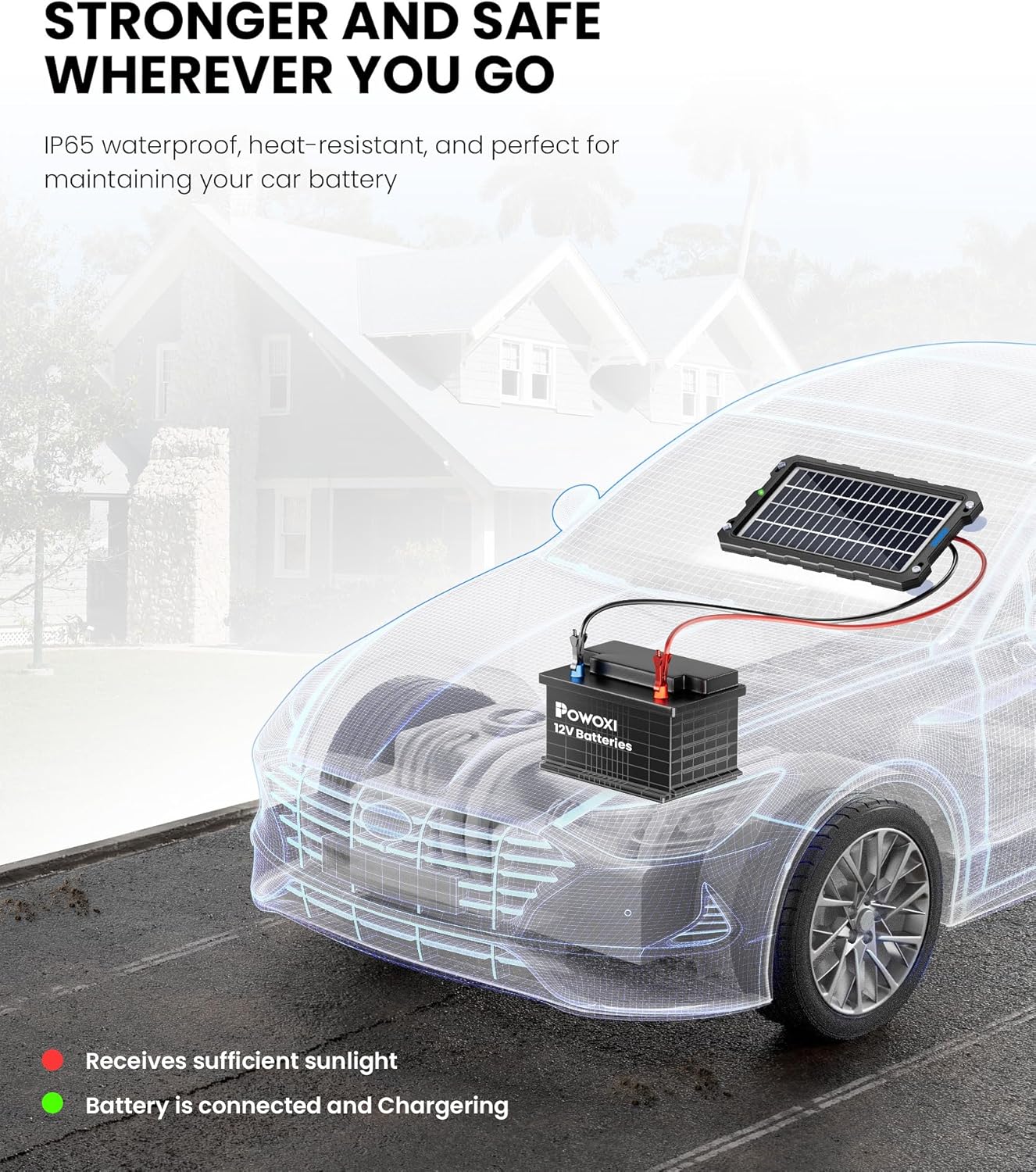Table of Contents
ToggleEver wished you could charge your electric vehicle anywhere without relying on the grid? A portable solar panel for EV charging solves that problem by giving you on-the-go, eco-friendly power—anytime, anywhere. But here’s the catch: most EV owners overlook this solution until they’re stuck far from a charging station. As electric vehicles go mainstream, portable solar charging is emerging as the ideal companion for sustainability, convenience, and true mobility.
Why You Need a Portable Solar Panel for EV Charging
Portable solar panels are not just about convenience—they’re about energy independence. Whether you’re a road tripper, an off-grid adventurer, or simply someone tired of relying on expensive grid electricity, solar gives you the power—literally—to take control of your EV charging experience.
Problem: EV Charging Infrastructure Is Inconsistent
Despite massive growth in EV adoption, the charging infrastructure still has major holes—especially outside of urban centers. Public charging stations are sometimes broken, occupied, or far from your route. Even in cities, availability can be a daily hassle. For remote travelers, the problem is even worse: no stations, no power, and no options.
Agitate: Inconvenience Can Be Expensive
A dead battery in a remote location isn’t just inconvenient—it can ruin travel plans, cost hundreds in tow fees, and pose safety risks. Even at home, relying on grid power exposes you to rising electricity rates and potential outages, especially during summer peak times or emergencies.
Solution: Solar Panels That Go Where You Go
A portable solar panel system lets you harness free, clean energy wherever the sun shines. It transforms your EV into a fully self-sufficient machine. From campgrounds and beaches to remote parking lots and festivals, you can generate your own power and gain true freedom from charging limitations.

How Portable Solar EV Charging Works
Let’s break down the typical setup and how solar EV charging functions.
Components of a Portable Solar Charging Kit
A basic system includes:
-
Portable solar panel(s) – Ranging from 100W to 400W per unit, often foldable or in a suitcase format.
-
MPPT charge controller – Ensures safe and efficient energy transfer from the panels.
-
Inverter – Converts DC solar output to AC if your EV or power station requires it.
-
Battery bank or portable power station – Stores energy before transferring it to your vehicle (optional but recommended).
-
EVSE (Electric Vehicle Supply Equipment) – Used to deliver AC power to the car’s charging port if needed.
Can You Charge an EV Directly from Solar Panels?
Technically, most portable solar panels don’t charge EVs directly, because the power output isn’t sufficient or compatible. Instead, solar panels charge a portable battery station (like a Bluetti or EcoFlow unit), which then powers your EV via a standard outlet or EVSE.
Solar Charging Efficiency and Range Estimates
-
A 300W panel can generate about 1.2–1.5 kWh/day in full sun.
-
This translates to 4–6 miles of EV range, depending on the vehicle.
-
Larger setups (1000W+) or multiple panels can increase this significantly, especially when paired with a high-capacity power station.
💡 Pro Tip: Use solar to top off your EV battery, extend range on trips, or maintain charge while parked—not necessarily for full charging cycles.

Use Cases: Who Benefits Most from Portable Solar EV Charging?
1. Off-Grid Travel and Overlanding
Off-road explorers and vanlifers can’t rely on fixed infrastructure. With a solar panel and portable power station, they can recharge phones, lights, and their EV—even in the wilderness.
2. Road Trips and Camping
Portable solar charging adds peace of mind on long journeys, where public chargers might be far apart. While you camp, your car quietly recharges from the sun.
3. Emergency Backup Power
Natural disasters, blackouts, or grid failures can disable your home EV charger. Solar ensures you’re not stranded—especially critical during evacuations or crises.
4. Daily Commuting Support
Even if you mostly charge at home or work, a small solar setup can reduce your grid dependency and offset a few miles of your daily commute with renewable energy.
Choosing the Right Portable Solar Panel for EV Charging
Key Factors to Evaluate
-
Wattage Output: Higher wattage = faster energy collection
-
Portability: Lightweight, foldable, easy-to-set-up panels are best for mobility
-
Durability: Weather-resistant panels with reinforced edges are ideal for travel
-
Compatibility: Ensure your panels and charge controller match your EV or power station
-
Storage: Consider pairing panels with a portable power station for energy storage and overnight use
Recommended Brands and Kits
Here are some top-rated, user-approved products:
| Brand | Model | Wattage | Key Features |
|---|---|---|---|
| Goal Zero | Boulder 200 Briefcase | 200W | Rugged, chainable, foldable |
| Bluetti | PV350 | 350W | Highly efficient, foldable |
| Jackery | SolarSaga 200 | 200W | Lightweight, pairs with Explorer stations |
| EcoFlow | 400W Portable | 400W | Fast charging, weatherproof |
| Renogy | Solar Suitcase | 200W | Adjustable stand, all-in-one setup |
The Future of EV Solar Charging
As EV and solar tech evolve, expect integrated solutions like solar-compatible trailers, roof-mounted panels, and EVs with built-in solar panels. Until then, portable solar kits offer the best mix of flexibility, power, and practicality.

FAQs
1. Can I charge my EV directly with a portable solar panel?
Answer: In most cases, no. Portable solar panels typically lack the voltage and amperage required for direct EV charging. Instead, they are used to charge a portable power station or battery bank, which then powers your EV via an inverter or EVSE (Electric Vehicle Supply Equipment).
2. How many watts do I need to charge my EV with solar?
Answer: A typical portable solar panel ranges from 100W to 400W. Charging an EV efficiently may require 800W to 1,200W of solar input or more, especially if you aim to replenish significant range. For trickle charging or emergencies, 200W–400W panels are a good start.
3. How much range can I get from a portable solar panel per day?
Answer: Under ideal sunlight, a 300W solar panel can generate about 1.2–1.5 kWh/day, translating to approximately 4–6 miles of EV range per day. Larger setups or multiple panels can increase this significantly.
4. What’s the best type of solar panel for EV charging?
Answer: Foldable or suitcase-style monocrystalline solar panels offer the best balance of portability and efficiency. Brands like EcoFlow, Jackery, and Bluetti make highly rated models compatible with power stations for EV charging.
5. Is it safe to use portable solar panels with my EV?
Answer: Yes, as long as you’re using a properly configured system that includes a charge controller and compatible inverter or power station. Avoid direct panel-to-car connections unless professionally designed for your EV model.
6. Can I use portable solar panels during cloudy weather?
Answer: Yes, but efficiency drops significantly. On overcast days, panels may generate only 10–30% of their rated output. Battery storage helps maintain charging during inconsistent sunlight.
7. How long does it take to fully charge an EV with portable solar?
Answer: Charging a full EV battery (e.g., 60 kWh) with a small solar setup could take days. Portable solar is best suited for topping off batteries, emergency range extension, or supplementing other power sources.
8. Can I use a solar generator to charge my EV?
Answer: Absolutely. Solar generators (like Bluetti, EcoFlow, and Jackery) store solar energy and can deliver AC power through standard EV charging cables. Make sure the output wattage meets your vehicle’s requirements.
9. Are portable solar panels worth it for EV owners?
Answer: Yes—especially if you travel off-grid, want emergency preparedness, or aim to reduce grid dependency. While not a full-time charging solution, they offer critical flexibility and energy independence.
10. Do I need a special adapter to charge my EV from solar power?
Answer: Most systems require a standard EVSE, often included with your car, and sometimes an adapter to connect with a power station. Always verify compatibility with your EV model and charging system.

Final Thoughts: Solar Freedom for Your EV Journey
A portable solar panel for EV charging empowers you to travel smarter, greener, and without limits. It’s your ticket to energy freedom—no more waiting in lines at chargers or stressing over battery levels. Whether you’re commuting, camping, or prepping for emergencies, solar gives your electric vehicle the independence it deserves. Ready to take charge of your power?
Disclosure: As an Amazon Associate, I earn from qualifying purchases.

